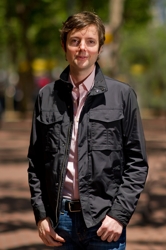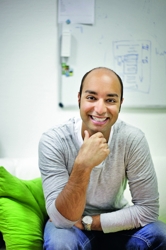It’s not often you come across a founder that measures startup success by winning the Nobel Peace Prize one day. When ResearchGate founder Ijad Madisch said that to Benchmark partner Matt Cohler a few years ago, he knew that his startup, which has developed a communication and crowdsourcing platform by which scientists can share and publish their research, was going to potentially change the way we solve real world problems with scientific collaboration. Flash forward two years, and Berlin-based ResearchGate is actually seeing progress being made in areas like disease, terrorism and more from collaborations and shared knowledge taking place on its platform.
Madisch joining us on stage at Disrupt Europe in late October, in Berlin, with a conversation with his board member and early investor Cohler.
 One of major challenges to plague scientific research and innovation is redundancy. A team of scientists hard at work on protein data analysis publish their results only to learn that a group on the opposite side of the world has just done the same. The collaborative web changes this. As both a physician and a researcher, Madisch decided that the best way to reduce research redundancy would be to create an online professional network in which scientists could easily share data, information and results.
One of major challenges to plague scientific research and innovation is redundancy. A team of scientists hard at work on protein data analysis publish their results only to learn that a group on the opposite side of the world has just done the same. The collaborative web changes this. As both a physician and a researcher, Madisch decided that the best way to reduce research redundancy would be to create an online professional network in which scientists could easily share data, information and results.
Investors have caught wind of the power of ResearchGate, and to date, the company has raised over $35 million from Benchamrk, Microsoft founder Bill Gates, Tenaya Capital, Dragoneer Investment Group, Thrive Capital, Accel Partners, Simon Levene, Bebo co-founder Michael Birch, Founders Fund, and Yammer CEO David Sacks, among others. The fact that Gates, who doesn’t rarely invests in startups with his personal wealth, is betting on ResearchGate is a big deal.
Matt Cohler is a General Partner at Benchmark. He’s responsible for identifying investment opportunities in Internet-related companies, in addition to working closely with companies across the firm’s portfolio.
At Benchmark, Matt has partnered with entrepreneurs from across the social, mobile and cloud industries from around the globe such as Instagram, Dropbox, Quora, Asana, Domo, Edmodo, Baixing, CouchSurfing, Peixe Urbano, ResearchGate, 1stdibs, and Zendesk.
Prior to joining Benchmark he served as the VP of Product Management at Facebook, where he led the development of new strategic initiatives for the company. As the seventh employee at Facebook, Matt played a crucial role within the team during many critical growth phases. Previously Matt was Vice President and General Manager at LinkedIn, where he was a member of the founding team. Matt also has been a consultant in McKinsey & Company’s Silicon Valley office and worked in Beijing for AsiaInfo, the Chinese startup that built the infrastructure for the Internet in mainland China. Matt’s writings on the startup economy have been published in Harvard Business Review. He holds a bachelor’s degree with honors and distinction from Yale University.
Ijad Madisch is the co-founder and CEO of ResearchGate, the social networking site for scientists and researchers to share papers, ask and answer questions and find collaborators.
Ijad holds a M.D. and Ph.D., and studied medicine and computer science in Hannover at Harvard University. In 2005 he received the RSNA Young Investigator Prize for his work on ultra high-resolution CT Imaging of tissue-engineered bone growth.
After several years in Boston, where he worked as a radiology researcher at the Massachusetts General Hospital, Ijad moved to Berlin and founded ResearchGate in 2008. The company is now based in Berlin and has offices in Cambridge, Mass. Ijad has stated that he wishes to win a Nobel Prize through the site by disrupting the way in which science is conducted.
As we mentioned above, the real power of ResearchGate is in the actual discoveries and advancements in science being made through the platform. Here are just a few of the many examples of how ResearchGate is changing scientific collaboration.
- Emmanuel Nnadi (Nigeria) and Orazio Romeo (Italy) recently discovered a deadly pathogenic plant yeast together. This yeast killed a 38-day-old baby girl in Emmanuel‘s hometown in Nigeria. It was the first time report of a death caused by this pathogen. Orazio and Emmanuel sent the yeast to a lab in the Netherlands where it‘s currently being investigated further. The unlikely team who got to know each other through ResearchGate previously found the first time occurrence of another pathogenic yeast in Nigeria, and published a paper about it in a peer-reviewed journal.
- Rafael Luque, professor for organic chemistry at the University in Cordoba and Rick Arneil Aracon, graduate student from the Philippines also found each other in a forum. The unlikely pair discovered that the leftovers of corncobs make highly effective and eco-friendly catalysts for bio-fuel made from old cooking oil and published a paper on the technique.
- David Chau stumbled into a discussion that had a huge impact on his current project. Through ResearchGate, he managed to connect with colleagues from different departments within his university and, as a result, gain access to equipment for the experiments he was conducting. He is now working on a new technique to detect tiny quantities of water in biological samples.
- Hector Vazquez-Leal, professor for applied mathematics at the University of Veracruz in Mexico, was looking for a research partner on ResearchGate. Here he found Guillermo Fer Andez-Anaya. They collaborated and discovered a new solution to Troesch’s Problem which allows the improved determination of the movement of gas in a confined environment. They published their result in a peer-reviewed journal. Vazquez-Leal is currently working on two more projects in the same field with research partners he found on the network.
- Sohail Malik (Political Science and Engineering, Pakistan) was looking for help in statistics, when he found Michael Sandholzer (Radiologist, UK) on ResearchGate. Together, they worked on Malik’s project to identify risk factors generating terrorism and insurgency in Pakistan. Their article has been accepted by a peer-reviewed journal and will appear in 2014.
“ResearchGate will change how we conduct science in the future,” says Madisch. He says that similar to the way that developers can code on engineering projects from across the work, there is the same opportunity in the scientific world.
Madisch tells us that 56 percent of research papers published in 2013 include an author that is on ResearchGate. From 2008 to 2011, 1.4 million papers were added to the profiles of scientists on ResearchGate. Now the network is seeing 1.4 million papers added each month, with 27 million papers uploaded in total. And much of the collaborative power is in sharing the raw data between scientists, and Madisch says that every two days, 1,300 data sets are uploaded. “The engagement is just growing exponentially,” he says.
However, ResearchGate isn’t the only company to have recognized the power of this collaboration—Academia.edu is also competing in the space.
How Madisch will continue to grow ResearchGate as a network, and use technology for this purpose will be part of the discussion with Cohler on stage at Disrupt. And we’ll also hear from him about the challenges and benefits of starting and maintaining a startup in Europe (Cohler believes Berlin will be the next big startup ecosystem).





0 comments:
Post a Comment